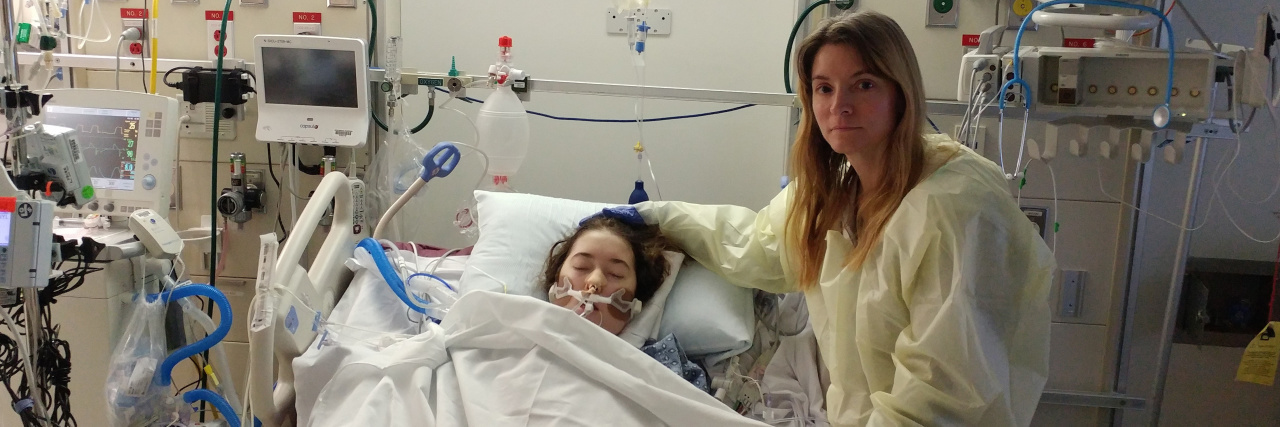What I Need You to Know If You Think COVID-19 Prevention Is Unreasonable
Do you know what it’s like to live inside an ICU for months, providing care for a limp body that you can’t even hug, one that belonged to a vibrant person you love? I do. Can you imagine what it feels like to weep every day, while still staying strong for everyone that needs you to, knowing that the person you love most is dying? I can. Do you know what it’s like to watch your child struggle for each breath while all vital organs shut down? I do.
Three years ago this week, my daughter finally came home from a horrible three-month hospital ordeal that nearly ended her life, multiple times. She had all the life-threatening complications that the coronavirus (COVID-19) brings with it, all acquired at the hospital.
Do you know what a central line is? A central line is a 20 cm catheter that is surgically placed into the jugular vein in the neck of very sick patients, which goes straight down into the heart so that nurses can give powerful medications delivered straight into the heart in attempts to save lives. Do you know what an arterial line is? It is another catheter that is placed surgically in the radial artery in the wrist of very sick patients for accurate blood pressure measurements and to monitor oxygen levels in their blood. These are high-risk procedures with infections likely unless maintained to impressive standards. These are likely to blow-out in very sick patients, too. Reinserting is harder each time, and comes with reduced chances of survival.
Do you know what sepsis is? It’s a deadly, widespread infection of the bloodstream. Do you know what septic shock is? Septic shock is the most serious form and often fatal since multiple organs are damaged and fail.
Have you heard of acute respiratory distress syndrome (ARDS)? It’s the respiratory complications that accompany serious illness like sepsis, and leads to dangerous blood clots (that can result in loss of a leg, death of the lungs and/or brain), collapsed lungs, further infections and permanent scarring of the lungs.
Do you know what ventilator-induced lung injury (VILI) is? VILI is the barotrauma, volutrauma, atelectrauma and biotrauma that often results from being on a machine that breathes for you during an illness. I learned all about this on the front lines initially, then I studied it so that I could be a part of the solution.
Do you know how hard it is to see your loved one in a coma with vital organs failing, on life support, and you know based on the facts that survival is unlikely? I do, and I can assure you it’s much harder than what Americans have been asked to do now — reasonably stay home, avoid people you don’t live with, simply wash your hands and stop the known behaviors that spread pathogens. It may sound so inconvenient to you, even an assault on your prerogative to do whatever you want. But, it’s really not; that’s just a skewed perception based on flawed views, beliefs and wants.
This one virus, called SARS-CoV-2, has caused over 52,000 deaths in just a few months in the United States alone. All flu viruses combined as causes of death in the last 10 years have ranged from 12,000 to 60,000 for the entire year in the U.S. Think about that, and you may realize that this virus is a real threat and that distancing has worked well to limit infected cases, limit the contagion and reduce how many sick people end up in the hospital and later the morgue. If we come out of this saying it wasn’t that bad — deaths were fewer than projected because hospitals were not overcrowded — that means we did the right thing by physically avoiding each other to stop the virus from hopping host to host. Opening businesses up slowly once case numbers are reducing and hospital capacity is reasonable also makes sense.
What’s really sad with COVID-19 is how patients suffer and die alone and afraid, in isolated hospital rooms. At least my daughter had a fighting chance three years ago because I was there providing care and support, monitoring the equipment, consulting with every expert I could across the country, constantly advocating for the right treatment and doing so nearly 24/7. COVID-19 patients do not have that advantage, and many will die once they get pneumonia, sepsis, ARDS or worse. If these facts have no meaning to a subset of Americans, it’s high-time they reassessed their values, ethics, morals and priorities.
For more on the coronavirus, check out the following stories from our community:
- Please Wash Your Hands Year-Round — Not ‘Just’ Because of the Coronavirus
- I’m Afraid I’ll Be Told to ‘Sacrifice’ My Health for COVID-19 Patients
- The Problem With Saying ‘Only’ the Elderly and Immunocompromised Will Be Affected by COVID-19
- How Is the New Coronavirus Treated?
- What You Should Know About Social Distancing During COVID-19
- If I Get COVID-19 It Might Be Ableism – Not the Virus – That Kills Me
- How America’s COVID-19 Response Is Exposing Systemic Ableism
Image via contributor

